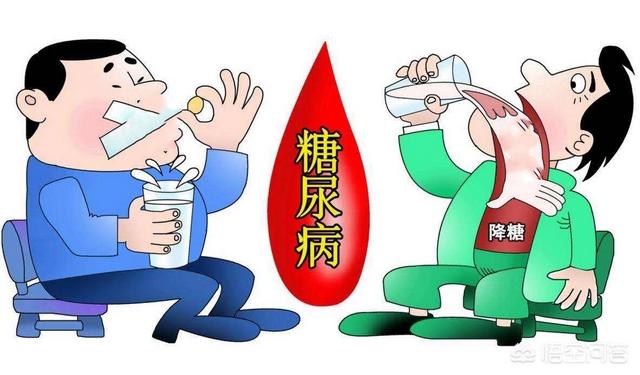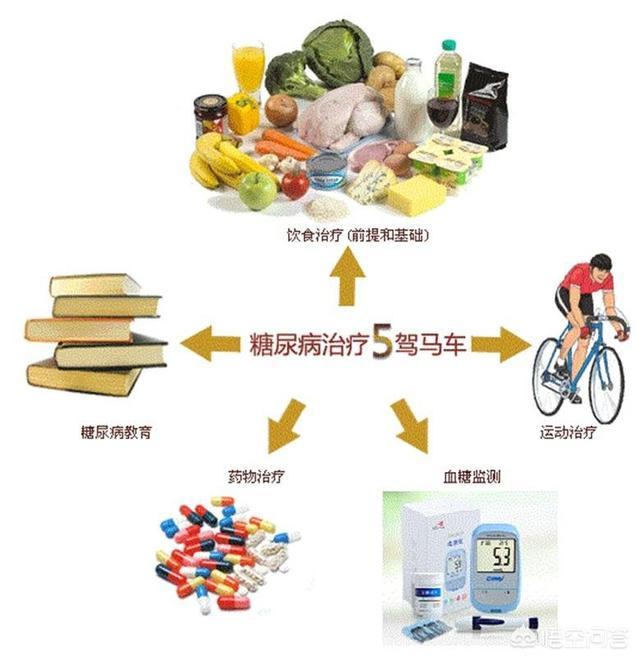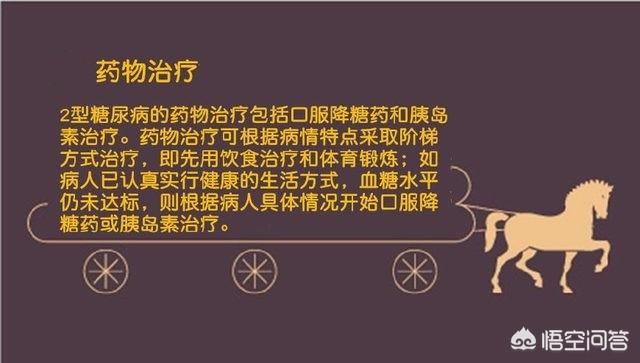Is a diabetic cured when his blood sugar normalizes after diet control and exercise?
Hi, as an endocrinologist I am happy to answer your question. This question is also often asked, some people through diet and exercise blood sugar control completely normal, is this considered a cure. I think we have to consider from two aspects, in fact, diabetes is not a single disease, I think it may be more appropriate to call the syndrome, because its etiology is not very clear, of course, except for single-gene disease caused by type 2 diabetes mellitus glucose is only a manifestation of it may also be associated with dyslipidemia, hypertension, high uric acid, coronary heart disease and so on have a close relationship with some of the early obesity of diabetic patients, through diet, exercise, Some early obese diabetic patients, through diet, exercise, weight loss and other treatments, blood sugar returns to normal, insulin resistance disappears, and blood sugar does not rebound, I think it should be considered a cure. We now also have diabetes treated through surgical methods, and blood sugar can be completely normalized, but this method I personally think is not a good method. However, some people can control their blood glucose through diet and exercise, but the pathological basis of high blood glucose has not been changed. Although the blood glucose can be normalized for a short period of time, the blood glucose rises again after eating normally, which is definitely not considered as a cure, but this is the case for most people. Because there is a long process from normal to diabetes, to really high blood sugar should be after 5-10 years, to let the pancreatic islet function recovery is very difficult. What's more critical is that we are currently treating the symptoms, because there are still a lot of causes that have not been figured out, so we still need to work together.
Feel free to follow my headline and feel free to share.
As a chronic metabolic disease, most mainstream views still believe that diabetes cannot be cured. However, for some mild diabetic patients, through their own efforts to strengthen dietary control and exercise, blood glucose does return to normal and maintain normal blood glucose, for such a situation, we do not have to dwell on whether the diabetes is cured, but rather we should cherish the health benefits of a healthy lifestyle, and long-term adherence to our healthy lifestyle.
Whether diabetes can be cured or not, dietary regulation and reasonable exercise are important aspects of our control of diabetes, some friends have mild diabetes problems, found early, and can be strict self-discipline, from dietary strict control, at the same time by the original do not love sports gradually strengthen the sports and exercise, through the reasonable eating and moving, can really reduce blood glucose levels, restoring insulin secretion, improve or even correct the insulin resistance, and therefore, blood sugar will gradually return to the normal range. For mild diabetic patients, through life control to achieve blood glucose standard, often can also last for a period of time, some short time, a few months later, through life control of blood glucose can not be controlled, or should be in the life of conditioning on the basis of the addition of medication for control.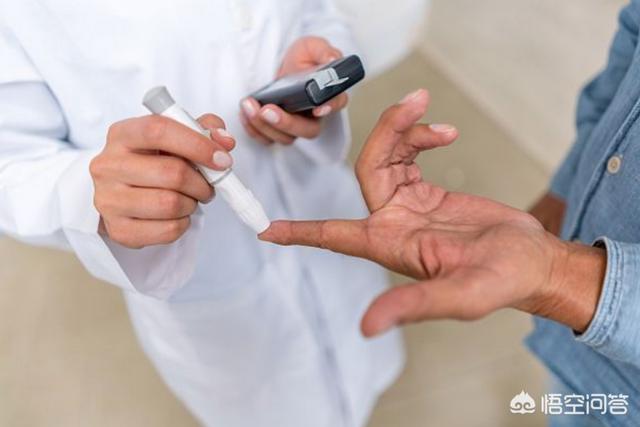
There are a few friends blood sugar back to normal time time lasts a long time, according to statistics, this diabetes by strengthening dietary control and exercise after blood sugar back to normal, some can last up to 13 years, do not know there is no longer examples, but there are indeed a few patients, through strict dietary control and reasonable exercise, so that the need for a very long time to maintain normal levels.
This is a kind of luck, if you can really do through diet control and strengthen the exercise control blood sugar for a long time to stabilize the standard, although do not see really from the root of the cure of diabetes, but this long time blood sugar to maintain, as well as a long time to maintain a healthy lifestyle, not only to improve the blood glucose, for the control of blood lipids and blood pressure, to reduce the risk of cardiovascular disease and so on, but also is a very good healthy lifestyle, worthy of Long-term persistence.
In this case, regardless of whether diabetes is "cured" or not, you should pay attention to two things: first, continue to adhere to our healthy lifestyle for a long time, and second, do a good job of monitoring and measuring blood sugar, checking the blood sugar level regularly to make sure that it is back to normal, which is also an important aspect of controlling blood sugar well.
If through a month or a few months of blood glucose monitoring, it is considered that diabetes is "cured", and life is no longer strict self-discipline, continue to start eating and drinking, smoking and alcohol abuse, then the chances of blood glucose re-emergence, and continue to develop diabetes is still very high, so, no matter whether it's our dietary control, exercise, or blood glucose monitoring, all need to be long-term, lifelong, if it is confirmed that blood glucose has been normal, of course, it is very good. Therefore, whether it is our dietary control, exercise, or blood glucose monitoring, we need to carry out long-term, lifelong, if it is confirmed that the blood glucose has been normal, of course, it is very good, if the blood glucose can not be effectively controlled through the life management, or even elevated to a high level, it is still necessary to consult a doctor, coupled with the reasonable use of medication to control the level of blood glucose, in order to reduce the health hazards brought about by high blood glucose.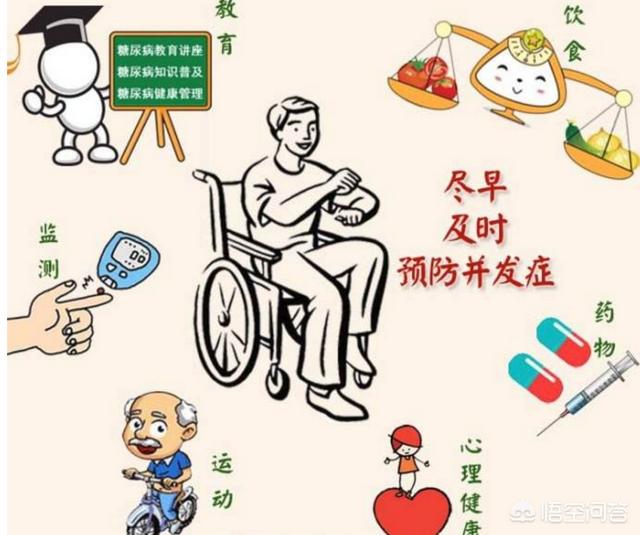
Diabetes life conditioning control, dietary structure adjustment, dietary habits adjustment, how to exercise exercise, we have talked about a lot, here will not say more, it should be noted that diabetic patients in the life conditioning intervention, in addition to pay attention to the above 2 aspects, reasonable weight loss, weight control, to maintain a good work and rest time, to avoid staying up late, smoking cessation, etc. is also worth noting the control of diabetes Healthy lifestyle, if you can do a good job of diet and exercise to regulate blood glucose at the same time, pay attention to the above aspects of life management, but also to strengthen blood sugar control, is also very good.
Finally, it is important to emphasize that the complex pathogenesis of diabetes has not yet been completely clarified under the premise of talking about a cure for diabetes, but for those who have been diagnosed with diabetes, according to the condition of the choice of a reasonable way to control blood glucose, no matter whether it is just rely on the life of the regulation of blood glucose can be controlled, or life of the regulation of blood glucose plus reasonable use of medication to control blood glucose, diabetic blood glucose control is a combination of life on the Strict self-discipline, understanding of diabetes-related knowledge, regular checkups, follow the doctor's instructions and rational use of medication combined with each other in a comprehensive process, personal efforts in the diabetes blood glucose control plays a vital role, and finally wish every sugar lover can be in a reasonable control of the diet, strengthen the basis of exercise and exercise, stable control of blood glucose, to maintain good health.
Diabetics through diet and exercise, the blood sugar control, that the condition is well controlled, but does not mean that the diabetes is "reversed", because you no longer control the diet and exercise, the blood sugar will be high back, diabetes is the need for lifelong control.
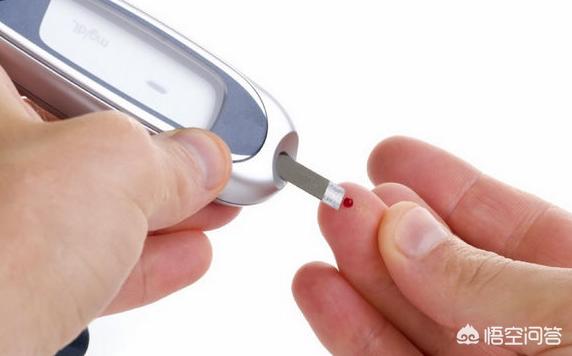
In the actual treatment process, there is such a situation. There are people who have high blood glucose in the early stage of the disease, and then after a few days of hospitalization and intensive insulin treatment, the blood glucose stabilized, and the later treatment may not inject insulin, only rely on diet and exercise to control blood glucose. The pancreatic function of these patients has not been severely damaged, and the intensive insulin therapy allows the patient's pancreatic function to rest and recover. Doctors consider people who are able to control their blood sugar normally without the use of medication to have had their diabetes "reversed".
This kind of people is a minority, but it does exist. Think about us sugar lovers, usually the most bitter is to inject insulin, the hypoglycemic drugs as a meal, if you can not take injections without drugs can control blood sugar, just need to restrain the diet, in fact, is not too far from the normal people.
However, most people with the disease still need to take injections and medication for a long period of time, because when many people find out about diabetes, their blood sugar has actually been high for a long time, and their pancreatic islet function is more severely damaged.
For more sugar encyclopedias, welcome to SugarManHealth.com!
If diabetes is diagnosed, there is no cure. Only through diet and exercise therapy to control fasting blood sugar. Therefore, diabetic patients should study the knowledge of diabetes, firmly believe that diabetes can be prevented and controlled, but not cured. Secondly, diet and exercise therapy should be the preferred method to do a good job in controlling blood glucose. Third, to strengthen regular self-testing of blood glucose, so that fasting blood glucose control within the normal range. Fourth, under the guidance of a specialist, medication should be used to control blood glucose.
Unfortunately, healing is not very likely.
It is advisable to check the insulin levels again, especially the postprandial insulin levels.
If you drink 75 ml of glucose + 200 ml of water "sugar water", two hours later, if the blood glucose level of 7.8 mmol / L or less, insulin level of 60 μIU / ml or less, then theoretically, diabetes is no longer a problem, or optimistically estimated, the body is basically cured, but this is very unlikely. This is very unlikely though.
Why is it important to test insulin levels?
This is because elevated blood sugar is only a result of diabetes, not the cause.
The main cause of type 2 diabetes is caused by an overproduction of insulin, which leads to a decrease in cellular sensitivity to insulin and an inability to lower blood sugar properly. Although it seems to be the opposite of what we know, the fact is that in all people with type 2 diabetes, it is insulin that rises first before the onset of the disease, and blood sugar rises later.
Some people's metabolic system has been out of balance for a long time, but every time they have a medical checkup, their blood glucose value is normal, and they mistakenly think that they are "healthy people" with normal blood glucose, such as the medical checkup report of the person in the picture below:

We would all think he was healthy if we only checked his blood glucose, but in fact, he was in pre-diabetes and the level of insulin needed to lower blood glucose was 2-3 times higher than normal, meaning that insulin sensitivity was severely reduced, and type 2 diabetes arose once insulin sensitivity continued to decline until the highest amount of insulin was secreted and still failed to lower blood glucose.
All of this is to make the point that even if your blood sugar is normal, it doesn't mean that your metabolic system is back to normal, much less that you are cured of type 2 diabetes.
Until insulin sensitivity is restored and the body produces normal insulin, it will be able to keep blood sugar at normal levels, then it can only mean that it's getting better. Anyway, having your blood sugar back to normal is a good start, but there is still a long way to go, cheers!
In fact, in the early stages of type 2 diabetes, there are cases of recovery through active improvement and treatment.
First, the word reversal is not scientific, it should be called a return to normal blood sugar status, which is to be congratulated first.
Secondly, type 2 diabetes, which is basically a lifestyle disease, can be kept away from type 2 diabetes by adhering to a healthy lifestyle such as exercising, controlling diet, quitting smoking and not staying up late, and eating less meat.
Thirdly, it is recommended that you maintain a healthy lifestyle, as you have already exceeded the blood glucose limit and worn the diabetic hat before, so you need to control your diet more strictly and exercise more in the future, and I wish you good health.
I don't know if you've heard of the diabetes honeymoon period?
Some patients with type 2 diabetes, especially in the first found themselves in diabetes, their pancreatic function or can, blood sugar is only slightly higher, this time we have many patients to eat a few days of hypoglycemic drugs to stop, but they are surprised to find that the blood sugar is at a normal level, to give them a kind of "healing" illusion, but in fact this is the honeymoon period, this time without medication blood sugar can remain normal for one to several months, but the time will soar. But in fact, this is the honeymoon period of diabetes, this time do not take medication blood glucose can be maintained one to several months of normal, but the time is over, the blood glucose will soar. So.We recommend that patients with the first onset of diabetes can take insulin for one to three months to allow the pancreas to rest for a period of time, and the pancreatic function can be repaired to a certain extent, which will slow down the progression of diabetes!

If you do not have a high blood glucose level, through exercise and diet control, blood glucose level has always reached the standard, then you just need to adhere to your lifestyle and pay attention to monitoring blood glucose, if your blood glucose does not always at normal levels, then we recommend that you follow the following five points to live!
I. Eat right!
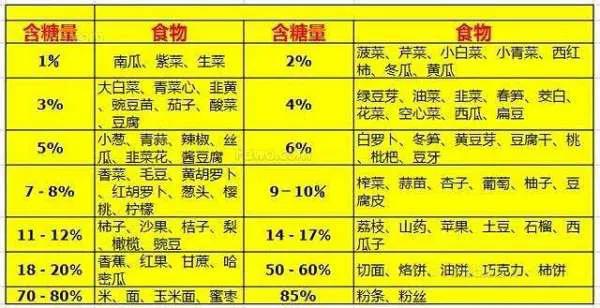
We can refer to the chart above to choose the ingredients thatAvoid foods rich in monosaccharides and disaccharidesThe food is rich in starch and fast digesting, such as honey, pastries, brown sugar, white sugar, avoid drinking diluted rice and other foods rich in starch and fast digesting, it is advisable to eat more cabbage, spinach, cucumber, these low sugar content, rich in dietary fiber food.Eat at least three times a day, each meal is best with a combination of staple foods and coarse grains.The ratio of refined and coarse grains is 6:4, advocating more dry and less dilute, less fried food, in the case of blood glucose control can be appropriate to eat fruits, and should be placed in the middle of the two meals to eat, you can avoid significant fluctuations in blood glucose.
Second, moderate regular exercise!
Try to exercise should choose fast walking, jogging, swimming and other aerobic exercise, exercise until you feel the body heat, sweat, but not sweating profusely, theIt is recommended to start exercising 1-2 hours after meals, 30-60 minutes each time, and at least 150 minutes of aerobic exercise per week.. Sugary/starchy foods that can be eaten immediately should be available during exercise to prevent hypoglycemic events.

(iii) Diabetes patient education!
Diabetes is a chronic disease and we need to be consistent in our diet, exercise and medication! Diabetes patient education not only raises our awareness of our disease and updates our concept of treatment, but also reminds us not to relax our management! It is only through persistence that we can get the maximum benefit!
IV. Regular blood glucose monitoring!
The most direct purpose of treating diabetes is to reach the blood glucose standard, how can we assess the blood glucose level accurately and timely? That can only be blood glucose monitoring, regular blood glucose monitoring can help us to adjust the treatment program, in order to choose the most suitable medication and appropriate dosage for us!
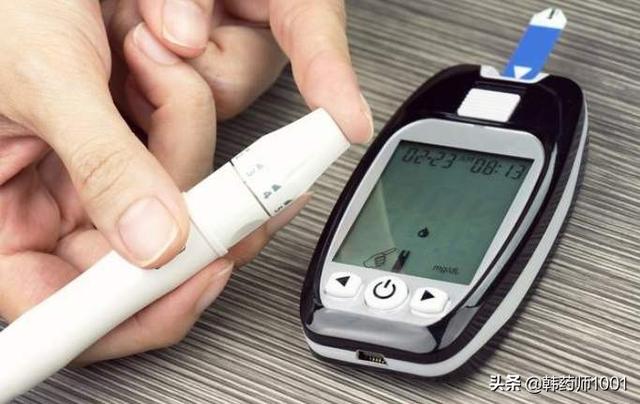
V. Medication!
If you are later diagnosed with diabetes, it should be treated as early as possible. There are many medications available for the treatment of diabetes, such as metformin, the cornerstone of type 2 diabetes treatment, glimepiride and repaglinide, insulin sensitizers, rosiglitazone, GLP-1 receptor agonist liraglutide, dipeptidyl peptidase-4 inhibitor rilagliptin, SGLT-2 inhibitor dalgliflozin, as well as a variety of insulin and so on! So there are a lot of glucose-lowering medications to choose from, and which one is best for you? That's a choice that needs to be made by a medical professional after an assessment based on the individual's condition!
Purely handwritten, I hope my answer was helpful! If you think the writing is okay, please like and follow!
Dr. Duan talks about science and brings you up to speed!The biggest wish of sugar lovers is to get their blood sugar back to normal through diet control and exercise without the help of drugs! This is the foundation of current diabetes treatment, and it is the first thing that sugar addicts should do and always stick to.
In fact, healing from diabetes depends on the reversibility of the disease that causes this disorder of calorie metabolism, not on the normalization of blood sugar.Therefore, normal blood sugar is just a state that sugar lovers need to maintain and most of the time it is not a cure.
In layman's terms, anyone can develop diabetes for a variety of reasons (especially poor lifestyle); a significant number of diabetics (especially early diabetics) can keep their blood sugar normal without medication because of self-management of their lifestyle.
Diabetes mellitus, as a chronic disease, is a metabolic disorder characterized by hyperglycemia with multiple causes. The treatment of diabetes is now very systematic and consistent.A physician-assisted treatment model that emphasizes self-management as the centerpiece!
to Prof. Hongding in the spring of 1995"The Five Troopers."Therapy is now recognized as a quality option for diabetes management.①Diabetes Education
It is an important basic management, which determines the success or failure of diabetes management, and it is important for every diabetic to receive comprehensive diabetes education, fully understand diabetes and master self-management skills!
②Dietary control
Many sugar users do not need drugs (Western medicine or traditional Chinese medicine), insulin, through diet control, exercise is OK. Even some sugar users do not need to exercise, diet control alone is no problem.
And in fact, every diabetic needs to prioritize dietary control, which is vital throughout the course of one's disease. To summarize, this means controlling total calories, eating small and frequent meals in a sensible way, low salt and low fat, and abstaining from smoking and alcohol!③Exercise therapy
Exercise therapy here refers to regular, self-tolerating, consistent aerobic exercise (aerobic exercise burns more calories). Exercise for 30 minutes or more, five days a week, is generally recommended, with longer periods for younger people.
Appropriate heart rate during exercise = 170 - age.
④Self-monitoring of blood glucose
This should be done throughout the course of the disease, even for normal people who should test their blood sugar regularly.
Only by dynamically detecting changes in blood glucose can you understand your blood glucose status and take a sensible approach.
⑤Drug therapy
Medication is a necessary measure when diet and exercise fail to bring blood glucose control up to standard. Good glycemic control is the key to avoiding a number of complications associated with high blood sugar.
Remember, giving only hypoglycemic medication in isolation from dietary control and exercise is not effective!Therefore, as people see the "rich disease" need to first "self-discipline" up! The "five carriages" you do not necessarily need, but you need a good frame, in order to see more of the world, beautiful scenery!
Follow Dr. Duan for health and wellness!
Hello, everyone! I'm Dr. Yang. This is an issue that I think we're all concerned about, so let me talk to you about it.
I don't know if you've ever heard of a medical concept calledClinical Cure.There are some cancer patients who may have heard of it, as the term is often mentioned in cancer.
What does it mean to be clinically cured?
We all know that cancer is an incurable disease, but there are many people who have survived for many years after the fight against cancer, and all the tests are basically normal. This situation can be called clinical cure in our medicine. To be more precise, if the cancer does not metastasize or recur within 5 years, it can be called clinically cured. But does this mean that there are no more cancer cells in our body? No, we are just saying that the cancer is under control, but there is still a risk of recurrence. After being clinically cured, we still cannot take it lightly, and we need to maintain a healthy lifestyle, strengthen our physical fitness, and have regular checkups to prevent recurrence.
Similar to the clinical cure of cancer has been mentioned in the treatment of chronic kidney disease, for example, after a series of treatment, our proteinuria is normalized, and blood pressure, blood lipids and other indexes are also normal when we stop taking medication, which is basically also known as clinical cure. However, this does not mean that chronic kidney disease is cured by us, it is still necessary to maintain a healthy lifestyle, enhance physical fitness, and regular review to prevent the recurrence of proteinuria and kidney function decline.

The same is true for the treatment of diabetes. Some diabetics in the case of no medication, after diet control, moderate exercise, weight control and other healthy lifestyle to control our blood sugar in the normal range of the, but can we say that we have diabetes to the cure? Of course not, if you do not believe, you can go to drink a bottle of carbonated beverages to try.
So-called clinical cure is not the same as healing
When a cold is treated and cured, we call it cured. In a chronic disease like diabetes, our own metabolism is already disturbed, either by insulin resistance or insufficient insulin secretion. Healthy lifestyle can reduce the metabolic disorder caused by the rise in blood glucose, if the long-term blood glucose is still normal, we can say it is clinically cured, but it is not the same as cured, because our metabolism is still disordered, just did not show, so we still need to adhere to a healthy lifestyle, regular monitoring of blood glucose, prevention and treatment of diabetes progression.

So, which diabetics may achieve clinical cure?
Mainly those diabetics who have just found out that their diabetes is only a little bit over the limit (e.g. fasting blood glucose of just 7.0mmol/L, 2-hour postprandial blood glucose of 11.1mmol/L), and whose own insulin function can still maintain their blood glucose, and who can control their blood glucose in a healthy way to reach the target range.
Some people are caught in time when they are still pre-diabetic, and if they intervene at this time, the likelihood of developing diabetes is greatly reduced.
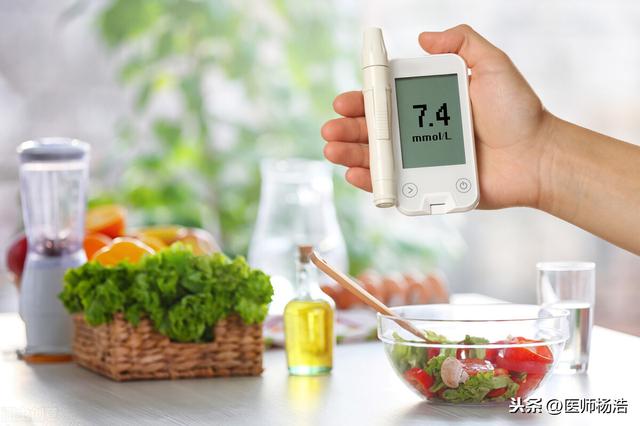
Well, today will speak so much, if you think speak can also point a praise chant ~ have questions can follow me to see more related health knowledge, thank you for reading.
Not cured.
This question and answer are from the site users, does not represent the position of the site, such as infringement, please contact the administrator to delete.
